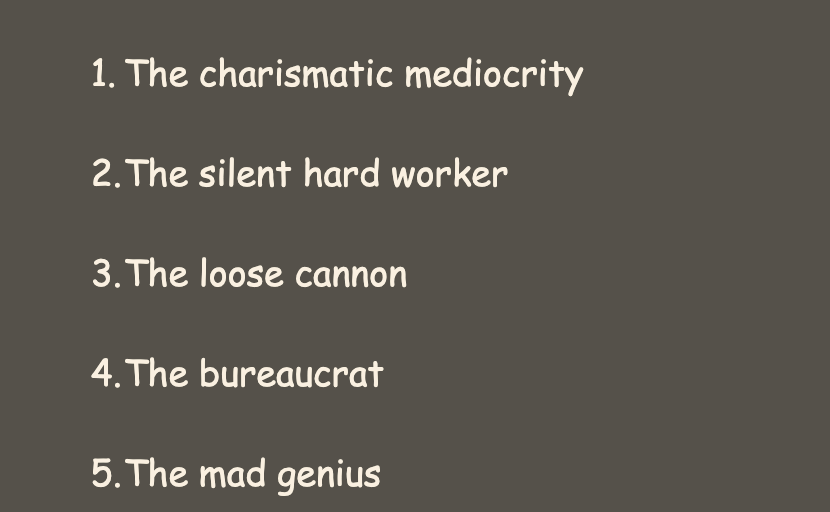An organisational team is rarely easy to manage, let alone be a part of. It is a complex mixture of unique individuals and styles, but there are patterns. Here are 5 common of corporate personality types — each of which comes with its own leadership challenge —an awareness of which may allow you to more effectively navigate your role.
1. The charismatic mediocrity
Has a pleasant manner and confident presence, but poor understanding of the core work. Tends to be adept at political manoeuvring and getting promoted despite their lack of expertise.
The leadership challenge is to leverage their skills where relevant, while ensuring they acquire sufficient core expertise.
2. The silent hard worker
Really knows their stuff, gets things done, but tends to be under-appreciated because of an unwillingness or inability to make their presence felt.
The leadership challenge is to support the individual to shine — to put a spot light on their contributions AND encourage them to share their ideas and come out of their shell.
3. The loose cannon
Really knows their stuff, gets things done, but is unpredictable in public forums and best kept hidden within the team.
The leadership challenge is to help them build more awareness into how their actions (no matter how well-intentioned) can derail proceedings. Some loose cannons are happy to remain behind the scenes.
4. The bureaucrat
Elevates form over substance even when this is detrimental. Obsessed with hierarchy and following the rules, they are a drag on getting things done.
The leadership challenge is to restrict their meddling to where it’s relevant, while helping them to build greater awareness into their own behaviour.
5. The mad genius
Exceptionally skilled and able to make contributions others cannot, but frequently disruptive to the team’s functioning. (The extreme form of this is the ‘toxic genius’ who ends up making a net negative contribution).
The leadership challenge is to allow them to do what they are good at while protecting the rest of the team. Of course, dismissal tends to automatically transpire if performance drops.
[Note: Overlap in styles is very common and they are best understood as dominant, not exclusive, styles]
_____________________________________________________________________________________________



Recent Comments